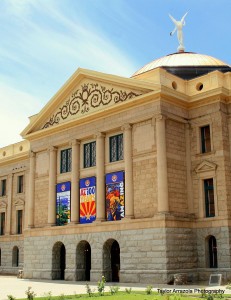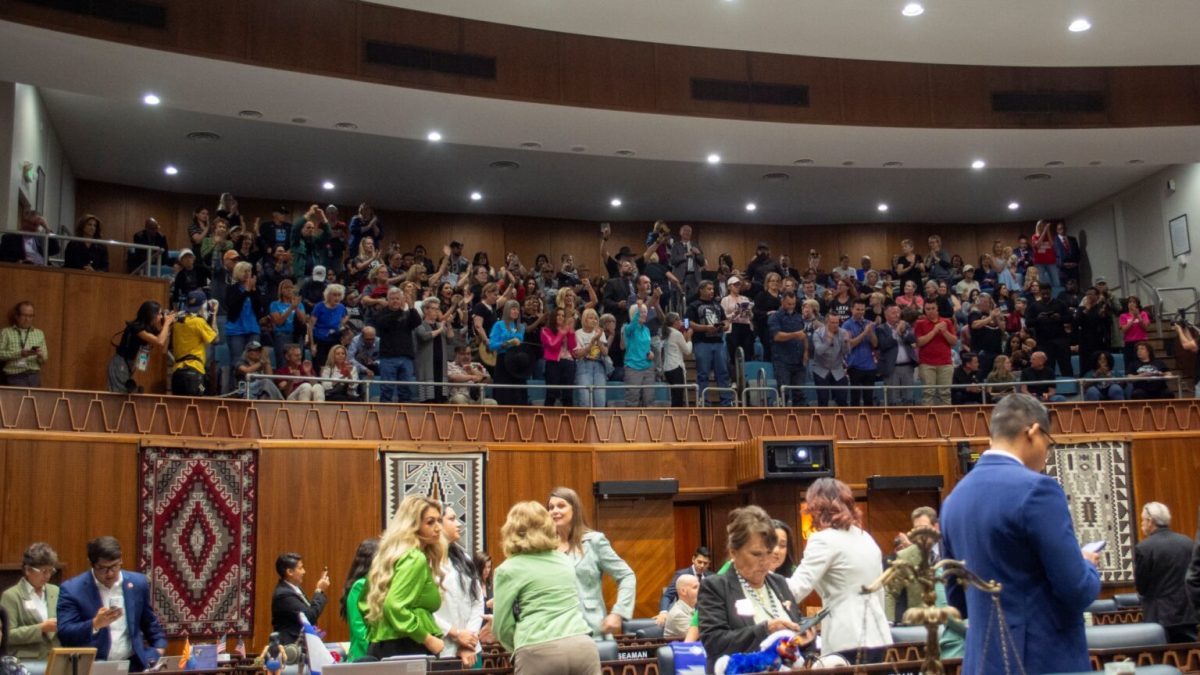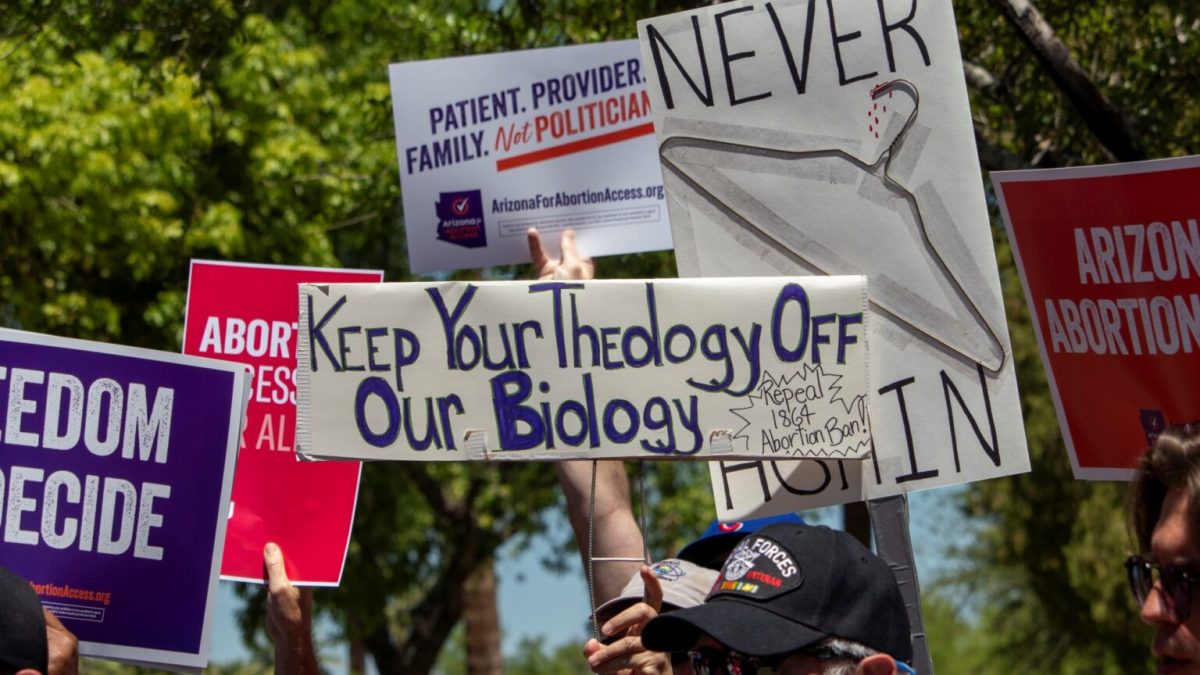PHOENIX – Arthur Olivas stood beside the model of the Liberty Bell that stands on the plaza in front of the state House of Representatives, wearing a sombrero and a shirt promoting the tea party. His message was simple: “I’m on America’s side,” he declared.
Nearby, six protestors, marked as motorcyclists by their long beards and ornamented leather vests, had a more specific message — an appeal for the removal of restrictions on handlebar height and for an end to what they called law-enforcement profiling. “We’re tired of being treated like criminals just because we ride Harleys and wear black leather. I get followed all around town,” said one of them, Victor Grady.
Elsewhere on the sun-drenched plaza, pro-choice activists with Planned Parenthood signs spoke to a crowd from a small stage, and at the edge of that crowd, other protestors paraded around in bright green shirts calling for the legalization of marijuana.
Meanwhile, inside a meeting room inside of the House of Representatives, friends and families of various legislators sat on old brown chairs in front of a video screen watching a choir render the National Anthem. As the “rocket’s red glare” lyric rang out, one woman sat back in her chair, closed her eyes and began singing along at the top of her voice.
Welcome to Opening Week at the 51st Arizona Legislature, where heartfelt declarations of patriotism, resolve, entreaty, collegiality and purpose abounded on Opening Day — but where the rifts and conflicts that marked last year’s bitter session soon began emerging as the week wore on.
On Monday, as legislators strode brimming with the good cheer they might have recalled from the opening day of school, the air was full of ceremony. On the floor of the House chamber, the desks were decorated with personal touches: small statues of elephants or donkeys next to nameplates, bracketed with little American and Arizona flags.
After Republican House Speaker Andy Tobin finally got everyone to sit down, many representatives took the opportunity to rise and introduce guests they’d invited for the occasion. Republican Rep. Justin Pierce, from District 25 in Mesa, proudly introduced his wife and children. “I think that having your family around you in these times is critical to us always remaining grounded,” Pierce said.
Democratic Rep. Victoria Steele, of District 9, which covers west Tucson, the Catalina foothills, Flowing Wells and Marana, brought a friend, Karin Uhlich, a city councilwoman from Ward 3 in Tucson. It was Ulich’s first time as a guest. “Most people, not just today, but over the coming weeks,” Uhlich said, “are anxious to see what our state leaders have in store for us, and there’s so much at stake right now. Most of us here are wanting to set a tone and direction for the coming year,” she enthused.
Republican House Majority Leader David Gowan, the District 14 representative from Sierra Vista, said that he liked the tone that prevailed, at least on opening day. “I feel good right now,” Gowan said after Gov. Jan Brewer had made her State of the State address. “It’s opening day and I like what the governor had to say. It was a good speech. I look forward to the session coming up,”
As platitudes and expressions of optimism still hung in the air, however, the usual conflicts began to surface while the actual business of the Legislature lumbered off to a slow start. Rep. Ethan Orr, a Tucson Republican representing District 9 attributed the low number of bills being introduced to the bitterness of last session.
“People didn’t know what the session was going to be like,” Orr said on Wednesday, speaking of the slow opening week pace. “I think everyone was kind of wary of, why put an effort into filing a bill if this is going to be as bitter as we all think it is, and nothing’s going to get passed?”
After the prayer and a Pledge of Allegiance to start the session on Monday, the House members – there are 36 Republicans and 24 Democrats — took the opportunity to roam and collect signatures while proceedings droned on. The lawmakers did pause, however, to sing “Happy Birthday” to Rep. Bruce Wheeler, a Democrat from District 10, which covers central and east Tucson.
But quickly, platitudes and birthday wishes gave way to bigger concerns. On Wednesday, Rep. Carl Seel, a Republican from District 20 in Phoenix,. used his time during the floor session to denounce a subpoena that he had received requesting that he divulge personal emails The American Civil Liberties Union is subpoenaing the supporters of SB1070, the controversial 2010 law that gave law enforcement wide power to detain and question suspected illegal immigrants. The United States Supreme Court overturned the more controversial parts of SB1070 in 2012.
Seel pulled out a pocket-sized copy of the U.S. Constitution and read aloud the Fourth Amendment, which prohibits unreasonable search and seizure,.and said that while he was going to comply with the subpoena, he felt that it violated his rights.
“I mean what do they want?” Seel asked rhetorically “Do they want love letters between me and my wife that talk about going to Mexico? Is that what they’re looking for? Because that’s basically what this subpoena would require me to produce.”
The subpoenas are an attempt by the A.C.L.U. to examine the personal emails of supporters of SB1070 for key words like “illegals” and “Mexican.” The Arizona Senate is requesting $100,000 of taxpayer money to be set aside for private legal representation for the current legislators being subpoenaed.
Still, because the first week is mostly spent introducing bills, many of the representatives remained cautiously optimistic.
“As a body, this is our second time together as a whole,” Democratic Rep. Stefanie Mach, from District 10, in Tucson, said, “We know each other a little better now, we know what our motivations are and maybe what direction we’re going to go in terms of legislation.”
Mach said she worries about the tone set by acrimonious debates last year. One of the disputes that the House will have to overcome is a Medicaid bill that elicited such intense feelings that both sides refused to meet for a week. The bill expanded Medicare for around 300,000 poor Arizona residents and was signed into law by Brewer in June last year.
“It was only months ago that we were in contentious debate over Medicaid expansion and I think a lot of people still carry those frustrations with them on both sides of the aisle, particularly those who lost,” Mach said. “What was done is done and now we have to think about how we’re going to take advantage of the next couple of months.“
Orr said he doesn’t think that the bitterness of last session had spilled over so far. Instead of worrying about last year’s divisions, he said he thinks that brandnew fissures will come with the new year. “I think that what you’re going to see is different fault-lines among the two caucuses, based on different values,” Orr said.
Wheeler said he hoped that lawmakers can stay away “cultural war issues” and focus on things likeeducation. “There are areas that we’ll be able to work with and do something good, and then she and I will probably be very frustrated when we adjourn at what wasn’t done,” Wheeler said, referring Mach, who represents the same Tucson area district.
On Thursday, the House pushed its floor session up to 9 a.m. instead of the usual 1:30 p.m. so that lawmakers could beat the notorious Phoenix traffic in their commute home for the long holiday weekend.
The only debate on the floor was between Republican Rep. T.J. Shoppe and Orr about whether the Arizona Wildcats would beat the Arizona State Sun Devils in basketball on Thursday night. (The Wildcats won handily, 91-68). Orr was wearing a maroon tie with Sparky the Sun Devil on it because he lost a bet to Shoppe when the Wildcats lost to the Sun Devils in football last November. Shoppe is an A.S.U. alumnus and Orr is a UA professor and alumnus.
Unlike many state capitols where nearby restaurants and bars often overflow with after-hours legislative merriment during the session, the Arizona Legislature isn’t known as much of a party school,so to speak. Many of the members represent districts close to the capital, and those who don’t stay in town for the legislative work-week andhead back home for the weekend. Usually things wrap up early on Thursdays and start late in the morning on Mondays in order to accommodate the commute that some of the legislators have to make.
Steele, for one, said that she values her two-hour commute as a time for reflection. “You get a lot of thinking done on that drive between Tucson and Phoenix,” Steele said.




